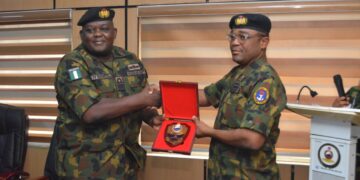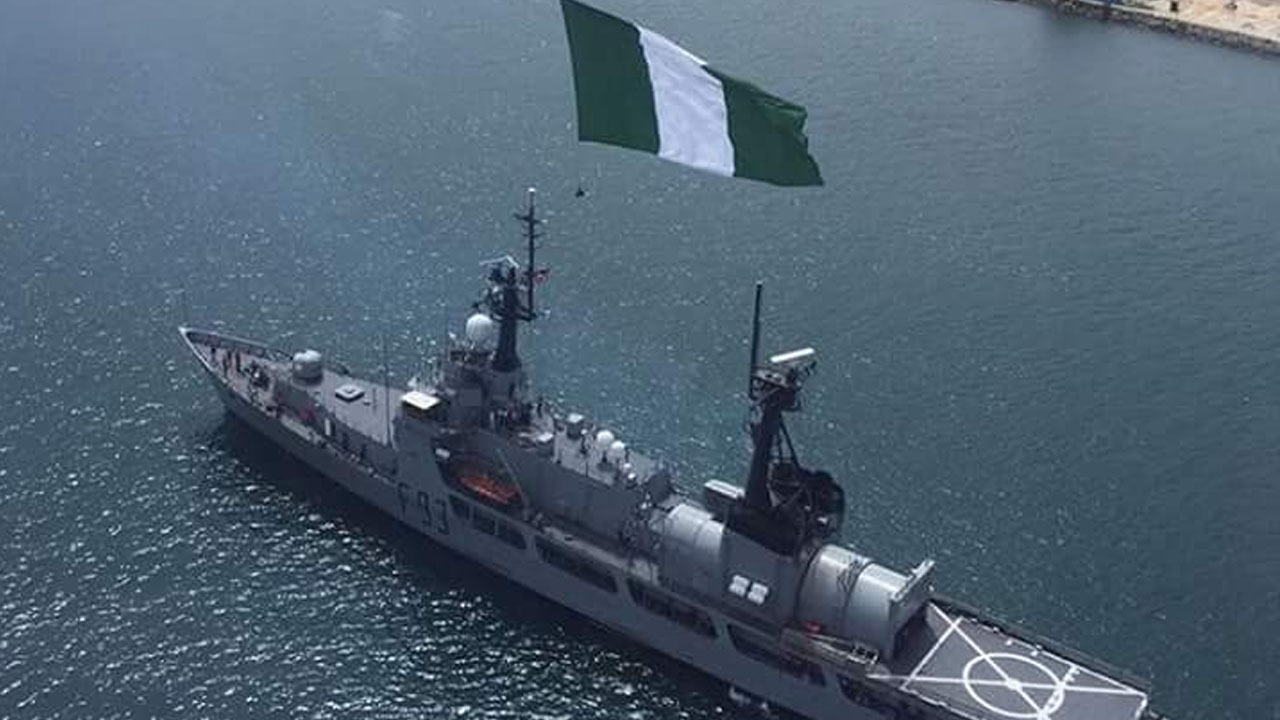President Muhammadu Buhari on Tuesday commissioned the multi-billion naira Falcon Eye Maritime Intelligence Facility built by the Office of the National Security Adviser at the naval headquarters in Abuja saying it will enable the Nigerian Navy to effectively combat any maritime crimes that could disrupt the conduct of maritime trade in the country.
Represented by Vice President, Prof Yemi Osinbajo, he said: “Nigeria’s hydrocarbon resources which are largely domiciled in our maritime environment remain the mainstay of Nigeria’s economy as it accounts for 55 per cent of our GDP, 95 per cent of our export earnings, and about 70 per cent of government revenue.
“It is estimated that Nigeria loses about $26.3 Billion annually to various forms of criminality particularly piracy and sea robbery. On account of the escalated risks in some of our maritime areas insurance premiums for commercial vessels coming to these areas have raised sharply making maritime trade an unattractive proposition.
“This underscores the need to enhance our maritime security architecture. Consequently, a critical contribution of the Falcon Eye System will be the provision of actionable intelligence for curbing maritime threats to our economy.
Disclosing that, “Some key identified threats within Nigeria’s maritime environment have taken on increasingly more harmful dimensions to our economy and even the safety of citizens and commercial entities who use the maritime domain, he said “these include, piracy, armed attacks on ships, kidnapping for ransom, crude oil theft, smuggling, as well as Illegal Unregulated and Unreported Fishing (IUU).
Continuing he said, “This administration has demonstrated a clear commitment to building the capacity of our strategic institutions to secure our coastal waters and the precincts of our maritime neighbourhood.
“On the 24th of June 2019, I assented to the Suppression of Piracy and other Maritime Offences Bill. By this Act, Nigeria became the first country in the West and Central African Sub-Regions to promulgate a stand-alone law against piracy, which is an important international requirement, set by the International Maritime Organization as part of measures to guarantee secure global shipping.
“The Act provides the much-needed legal and institutional framework to improve maritime security and ensure safe and secure shipping in Nigerian waters. Last year, we commenced prosecution and secured our first convictions under this law.
“This is the whole point of this project. A facility that has the capacity to spot, chase and interdict maritime criminals quietly and efficiently.
“So the Falcon eye system is a state-of-the-art surveillance facility that incorporates various sensors located along the nation’s enormous coastline, such as Radars, long range Electro Optic Systems with thermal or night vision capability, Automatic Identification System receivers, Weather Stations and marine Very High Frequency Radios for communication.
“The integration of these sensors into the Falcon Eye system generates a real-time situational awareness of the activities of vessels in Nigerian maritime domain and some selected parts in the Gulf of Guinea.
“This will enable the Nigerian Navy generate a comprehensive intelligence picture of activities within our maritime environment for further analysis before, in appropriate cases , dispatching a Nigerian Navy Ship for interdiction, investigation, and/or subsequent arrest of erring vessels.
“The Falcon Eye System will serve as a force multiplier for our naval platforms tasked to effectively secure our maritime environment from external aggression. It will also enable the Nigerian Navy to effectively combat any maritime crimes that could disrupt the conduct of maritime trade”.
Earlier, the National Security Adviser, Major Gen Babagana Mongonu (rtd) disclosed that the Project was borne out of the necessity to combat the myriad of security challenges within the maritime sector ranging from cases of kidnapping of oil workers, sea robbery/piracy, incessant problems of crude oil theft, illegal bunkering, hostage-taking, maritime terrorism amongst other criminal activities perpetrated within the maritime domain.
“The contract for the project was signed in 2014 and designed to provide Nigeria with an effective surveillance capability of her entire maritime domain, particularly the coastline and Nigeria’s Exclusive Economic Zone (EEZ). Although it was initially a 2-year project due for completion in 2016, as a result of challenges beyond our control, this was not possible. Nonetheless, we are happy to have attained this level of near completion with the current operational capacity of the facility.
“Scope of the Falcon Eye project includes the establishment of a detection layer, identification layer as well as command and control centres. It also includes the installation of mobile platforms and the training of personnel. In addition, the facilities of the Project are designed to combine massive multilayer surveillance sensors to generate a comprehensive real-time picture of the activities within Nigeria’s maritime area of interest.
Meanwhile, the main sensors for the facility are made up of the ‘Over The Horizon Radars; Coastal and Satellite Automatic Identification Systems; Electro-Optic Systems; and Marine Rectos. This enables the Project to provide real-time information through a fusion of information generated by these sensors.
It is also important to mention that a distinct feature of the Project is the Over the Horizon Radar which can detect maritime criminal activities up to 200m; the outermost of Nigeria’s Exclusive Economic Zone. Most importantly, this facility provides total radar coverage of Nigeria’s Maritime Environment which would greatly assist the Nigerian Navy to achieve its operational objectives.
Emphasizing that the Project is primarily meant to enhance the Nigerian Navy’s operations with a lot of successes already recorded by the Navy in reducing criminality within the maritime domain, the NSA said, “It is for this reason that the Project has a maritime stakeholders’ cell here in the Main Control Centre to accommodate representatives of the Nigerian Maritime Administration and Safety Agency, Nigerian Ports Authority, and Marine Police, amongst others.
In his remarks, Chief of the Naval Staff, Vice Admiral Awwal Gambo said, “The Falcon Eye incorporates surveillance and intelligence capabilities that enable decision making on shipping activities, maritime safety and violation of maritime laws.
“This translates to complete coverage of Nigeria’s Exclusive Economic Zone. Monitoring and analysis of data from the various sites strategically located along the nation’s coastline facilitated through the 4 Falcon Eye Centers in Abuja, Lagos, Yenagoa and Calabar.
“Penitently, the coverage of the satellite aspect of the Automatic Identification System of Falcon Eye extends beyond Nigerian waters to Cote D’Ivoire at the West, Cameroon at the East, and Angola at the South East.
“This significant capability enhances the maritime projection capabilities of the country and enables the Nigerian Navy to maintain strategic partnership on information sharing, especially with navies of the Gulf of Guinea nations, as well as Indian and Italian navies.”
The Vanguard.
































































